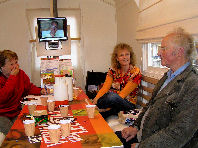One of the formats of digital storytelling is the telling of stories in areas, where the population is dying out. And as I have mentioned before, it has also become format in new cities. As an example I used the new town in the polder, where I am living in. the city of Almere. But recently I discovered that the other city in the same polder, the new town of Lelystad, has a cross media project storytelling project Het verhaal van Lelystad (The Story of Lelystad) for half a year.
Last Friday the project DVD was presented. The project had been initiated by the municipality and the execution was in the hands of the public library. The objective was to create a social cohesion and record the history of Lelystad, a new town which was founded in 1967 and was incorporated as a municipality in 1980. For more than half a year inhabitants of Lelystad could tell their story, which was recorded in audio and filmed. More than 250 stories were told by men and woman, young and old and Dutch and people from abroad.
The stories are basically concerned with travelling. For after the polder pioneer generation people came from all over The Netherlands, but also from former Dutch colonies such as Surinam and from elsewhere in the world. The stories are about the city itself, but people tell also how they came to Lelystad. It is funny that inhabitants of a new town always have to defend their choice of the city; when someone moves to Amsterdam no one asks why.


A special tour of the city quarters was set up with meetings where people could tell their story. There was a close co-operation with social organisations, schools, churches, mosques. Also a special canteen caravan of the type, which polder workers had used, served as a small intimate studio for people to tell their stories. And there were many a living room session. The project had trained storytellers and professionals; the local movie club Flevo Lacus filmed the sessions.
From the beginning it was clear that it should be a cross media project. Now there are a website and a DVD with a selection of recorded stories on film. A book is in production.
Tags: storytelling
Blog Posting Number: 575

No comments:
Post a Comment